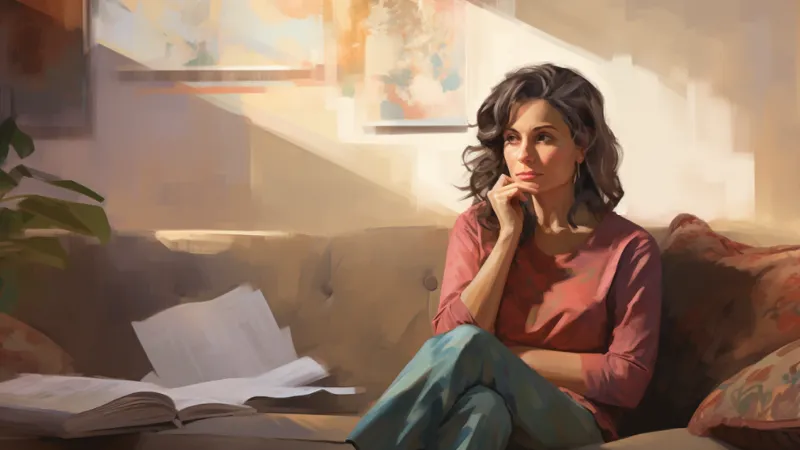
How Do You Identify Clutter
Do you find yourself having a lot of stuff you hardly use?
Wondering how to distinguish between valuable possessions and clutter?
Watch the YouTube™ episode, or read below:
Ah, clutter. . .
. . , The notorious villain of our homes.
We've all had that nagging feeling when looking at a messy room, haven't we?
Do you ever find yourself searching for your keys amidst a sea of papers and random objects, feeling the weight of the mess around you?
Or perhaps you've spent hours looking for a specific document on your cluttered desk, only to realize it's buried beneath a pile of unsorted paperwork?
Clutter often sneaks its way into our lives, quietly taking over our space and peace of mind. . .
But what if we could redefine clutter, eliminate the guilt associated with it, and shake off the pressures others might impose on us about it?
Explore the true nature of clutter, let go of unnecessary guilt, and free ourselves from the weight of external expectations.
What is Clutter?
We all might think we know what clutter is. . .
It's that pile of magazines from two years ago, right? Or those clothes we swear we'll fit into again someday.
Well, yes. But clutter is more tricky than you might think.
Some things are obvious clutter.., like garbage or clothes that are falling apart. Even decor items you don't like are pretty clear. But there's another kind of clutter that's not so easy to see.
That's a common experience! Sometimes, you've lived with your things for so long that you become "clutter blind" to them, and they blend into the background. You don't even notice them anymore.
According to Simple Lionheart Life, here are…
13 questions to ask yourself to identify the clutter in your home:
Do you use it regularly?
Clutter is often something you don't use regularly. If you rarely use it, it might be clutter.
When was the last time you used it?
Think about when you last used an item. If it's been a while, it could be clutter.
When will you use it?
Having a clear plan for when you'll use something can help you avoid clutter. If you can't foresee using it soon, it might be clutter.
Do you have more than one?
Duplicates or multiples of the same item can create clutter. Keep what you need and use; let go of duplicates.
Have you replaced or upgraded the item but kept the old one?
Holding onto the old item after upgrading can lead to clutter. If you're not using the older version, it's likely clutter.
Is this where the item belongs?
Sometimes clutter happens when items are in the wrong place. Put things where they belong to clear this type of clutter.
Does it have a home?
Items without a designated place can become clutter. Find or create a spot for important items.
Did you forget you had it?
If you discover something during decluttering that you forgot you owned, it's likely clutter.
Would you replace or re-buy this item?
Ask yourself if you'd buy the item again today. If not, it's probably clutter.
Are you keeping it "just in case" or "what if" you need it "someday"?
Items you're holding onto "just in case" or "someday" might be clutter. Focus on what you currently use or love.
How does the item make you feel?
Keep items that make you feel positive. If something evokes negative emotions, consider decluttering it.
What does it mean to you?
Not everything with sentimental value to others holds meaning for you. If an item lacks personal significance, it may be clutter.
Is the item adding enough value to justify the time, space, and energy it takes up?
This is a critical question. If an item doesn't add more value than it takes in time, space, and energy, it's likely clutter. Keep things that enhance your life, not hinder it.
By asking these questions and being mindful of your possessions, you can effectively identify and tackle clutter in your home. Moreover, there's an intricate web linking clutter, disorganization, trauma, and neurodiversity.
Understanding this connection can shine a light on why our spaces get cluttered in the first place.
Reasons for Clutter
Clutter, that silent invader of our living spaces, doesn't just happen by chance.
Remember that adorable souvenir you bought during your trip?
Or perhaps that whimsical purchase made on impulse during a mega sale?
Those aren't just random acts. Often, they're a result of emotional bonds or societal pressures nudging us to collect.
At its very essence, clutter embodies those items that occupy space without adding anything meaningful to our lives. So, while an old magazine or that slightly tight pair of jeans might be obvious examples, clutter can be anything that unnecessarily weighs on our mind and space.
To effectively tackle clutter, it's important to understand these underlying causes.
Sentimentality: The Emotional Bond with Things
One of the most common reasons clutter sneaks its way into our homes is sentimentality. The problem arises when sentimentality blinds us to an item's true value in our present lives. We hold onto things not because they serve a practical purpose but because they hold emotional significance. Recognizing this emotional attachment is the first step in dealing with clutter effectively.
Fear of Letting Go: What If I Need It?
Another formidable force behind clutter is the fear of letting go. We've all heard ourselves say, "What if I need it someday?" This fear often leads to hoarding items that we haven't used in years and likely won't use in the foreseeable future. It's about recognizing that the "someday" we cling to might never arrive, and in the meantime, these unused items weigh us down.
Impulse Buying: The Temptation of Retail Therapy
The allure of impulse buying is a well-known culprit in clutter accumulation. Those "too good to pass up" deals or spontaneous purchases during a sale can quickly lead to a home filled with things we didn't truly need. It may offer momentary satisfaction, they often contribute to long-term clutter. Being aware of the urge to buy on impulse and resisting it is key to preventing clutter at its source.
Societal Pressures: Keeping Up with the Trends
The desire to keep up with the latest trends or adhere to societal norms can lead to overconsumption. We buy items because we believe we should have them, not necessarily because we genuinely want or need them.
The sweet memories attached to things often make us hoard them. . .
The fear of letting go is real. To genuinely free ourselves from the clutches of clutter, acknowledging these underlying reasons is imperative.
So, if you find yourself wondering why it's essential to identify and eliminate clutter, think about its origins and emotional impacts.
To help you start, according to Simple Everyday Home, here are…
6 Rules for Knowing What Things to Declutter:
It makes you cringe: If something in your home gives you a knot in your stomach or makes you feel guilty, like abandoned projects or piles of unwanted clothes, it's time to deal with them.
It isn't something you like, wear, or use: Keeping items you won't use only adds to the clutter. Whether it's non-functional deodorant or clothes you no longer like, let go of what you don't need.
It hides important things: Clutter that obstructs access to necessary items, such as newspapers covering permission slips or mail concealing bills, should be sorted and removed promptly.
It insults you: Items that bring negative emotions or painful memories, like reminders of hurtful relationships or ill-fitting clothes, don't belong in your home. Letting them go can release the associated guilt and pain.
It causes you to procrastinate: Items that lead to procrastination with phrases like "later" or "someday" can hold you back. Clear them out to improve efficiency.
It inconveniences you: Anything that makes your daily tasks more difficult or forces you to work around it, like cluttered desks or stale food, is costing you time. It's worth taking a few minutes to declutter and find what you need easily.
Removing Guilt from Clutter
It's not just about a messy room or a bunch of unused items. Think about those trinkets gathering dust on your shelves, or that overstuffed closet filled with clothes you no longer wear. . .
Clutter can be physical, mental, or emotional. With that, it's not uncommon to feel a twinge of guilt when faced with clutter in our homes. The guilt can stem from various sources: unfinished projects, unused purchases, or sentimental items that no longer bring joy.
The good news is that you can declutter not only your physical space but also your guilt. Here's how:
Embrace Imperfection
One of the primary sources of guilt in decluttering is the feeling of not living up to a perfect, organized ideal. We often compare our homes to those picture-perfect ones on social media or in magazines. Remember, those images are often staged and don't reflect real-life living.
Embrace imperfection as a part of life. The goal is not flawlessness but functionality and comfort.
Let Go of the "Shoulds"
Guilt often arises from the "shoulds" in our minds. We feel we "should" use that treadmill more often, "should" finish that knitting project, or "should" hold onto gifts we don't like. Recognize that these "shoulds" are self-imposed expectations that may not align with your current priorities and interests.
Reevaluate your "shoulds" and replace them with what truly matters to you. If an item doesn't serve a purpose or bring you joy, it's okay to let it go without feeling guilty.
Understand the Sunk Cost Fallacy
The sunk cost fallacy is the tendency to continue investing in something (in this case, clutter) because of the time, money, or effort already spent on it. For example, you might hold onto an expensive but uncomfortable piece of furniture simply because you spent a significant amount on it.
Recognize that keeping something solely because of past investments doesn't make it more valuable or useful in the present.
Focus on the Benefits of Decluttering
Shift your perspective from the guilt of letting go of the benefits of decluttering. When you remove excess items from your space, you create room for the things that truly matter.
Imagine how you'll feel when you no longer have to navigate through piles of unused items or when you can easily find what you need without sifting through clutter. These positive outcomes can outweigh any initial guilt you may feel when decluttering.
Donate and Repurpose
If parting with certain items feels too guilt-inducing, consider donating or repurposing them.
That old bookshelf collecting dust in the garage could become a charming piece in your garden shed.
By embracing imperfection, reevaluating expectations, understanding the sunk cost fallacy, focusing on the benefits, and finding ways to give new life to items, you can remove the burden of guilt from clutter.
Remember, a clutter-free home is not only visually appealing but also mentally freeing.
Awareness is the Real Beginning

So, why is it important to identify and eliminate clutter? Simple.
It's not just about aesthetics or space. Clutter takes a toll on our minds and bodies.
Ever had that suffocated feeling in a cluttered room?
It's a real phenomenon. Our brains interpret chaos as distress. Stress, anxiety, and even despair can spiral out of control when we're surrounded by mess.
But that's not all. The physical risks are just as daunting: "Imagine tripping over stuff, facing health issues due to accumulated dust, or the sheer frustration of not finding a pen when you need one!"
The emotional strain is equally taxing. A single unchecked pile of items can soon become a mountain, making the whole space feel impossible to clear.
By embracing this awareness, we redefine our relationship with possessions. Recognizing that they should either serve a practical purpose or bring us genuine joy. Clutter loses its grip when we no longer allow it to define our spaces or our lives.
Decluttering: Strategies to Regain Control
There's hope yet! Addressing clutter isn't as daunting as it might seem.
Start small. Focus on a drawer or a shelf. Embrace its emptiness, give it a little spruce up, then intentionally choose what deserves to reside there.
If you're on the fence about an item, Your heart's response can guide your actions.
Always remember: there's no shame in seeking assistance. Be it enlightening books, or videos like the ones we're fond of creating. Decluttering transcends physical tidying; it’s a path to mental clarity and emotional rejuvenation.
In Conclusion: Revel in a Clutter-Free Existence
So, next time you're overwhelmed by the chaos around you, take a deep breath. Remind yourself of the deeper reasons behind clutter and arm yourself with strategies to conquer it. The journey from clutter to clarity is transformative.
Ready to take the plunge and declutter your life? Start by grabbing your copy of "Put That Stuff Down 2," our comprehensive guide to conquering clutter and finding serenity in a well-organized life. Click the link below to begin your journey to a clutter-free, fulfilling life.
“Click Here to Get Your Copy of "Put That Stuff Down 2"
Don't let clutter hold you back any longer. Embrace the clarity and peace that a decluttered space can bring. Dive in, declutter, and rediscover the serenity of a life well-organized.
Your clutter-free journey starts now!




